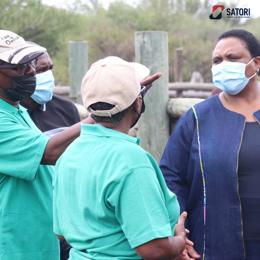Image created by AI
Stalled Land Restitution in South Africa: Over 80,000 Old Claims Await Resolution Amid Legal Limbo
The ongoing struggle for land restitution in South Africa has hit yet another impasse, with the Land Claims Commission obliged to adhere to a Constitutional Court ruling, which for eight years has halted the processing of thousands of "new order" claims. The issue was brought to the fore once again when the Minister of Land Reform and Rural Development, Mzwanele Nyhontso, offered a detailed account of the standing claims in a written statement addressing questions posed by EFF MP Sam Matiase.
Minister Nyhontso clarified that a substantial backlog of “old order” claims remains unresolved, with over 80,000 cases spread across South Africa’s provinces. These claims date back to submissions made before the December 1998 deadline and must be processed before the Commission can tackle the more recent "new order" claims, which number a staggering 163,383.
The Constitutional Court's decision, stemming from a case known as Land Access Movement of South Africa (Lamosa), continues to dictate that the "new order" claims lodged from 2014 to 2016 must wait indefinitely. This stipulation is in place until all "old order" claims are finalized, a process mired in complexity and delay.
The breakdown of the "old order" claims across the provinces exemplifies the extensive work that lies ahead:
- Mpumalanga: 10,405 claims
- Gauteng: 22,924 claims
- Northern Cape: 6,129 claims
- Free State: 24,815 claims
- Eastern Cape: 12,654 claims
- Limpopo: 16,349 claims
- Western Cape: 18,654 claims
- KwaZulu-Natal: 39,868 claims
- North West: 11,585 claims
This comprehensive overview indicates a significant workload for the Commission that is further compounded by the need for new legislative measures to address the interdict on the "new order" claims.
A ray of hope appeared in the form of a Private Members Bill introduced by the ANC in August 2017, aiming to rectify the legislative void; unfortunately, the bill fell by the wayside with the conclusion of Parliament's fifth term in 2019. As a result, the Commission's hands remain tied, unable to advance with the "new order" claims until Parliament enacts new legislation.
As mandated by the court, the Chief Land Claims Commissioner must report biannually to the Land Claims Court, detailing progress on the "old order" claims and specifying anticipated completion dates. To date, nine such reports have been submitted, complying with the LAMOSA 2 requirements. Minister Nyhontso also noted that these reports should outline any obstacles the Commission faces, whether financial or otherwise, that could impede the completion timeline.
The lengthy delay raises questions not just about the restitution process but also about the government’s larger commitments to land reform, a contentious and emotionally charged issue in South Africa's socio-political landscape.
The Land Claims Commission’s struggle with legislative and operational limitations highlights the need for a more agile and effective approach to land restitution. For the tens of thousands of claimants still awaiting the resolution of their cases, the pursuit of justice in reclaiming their ancestral land continues to be a distant dream within South Africa’s democratic dispensation.








